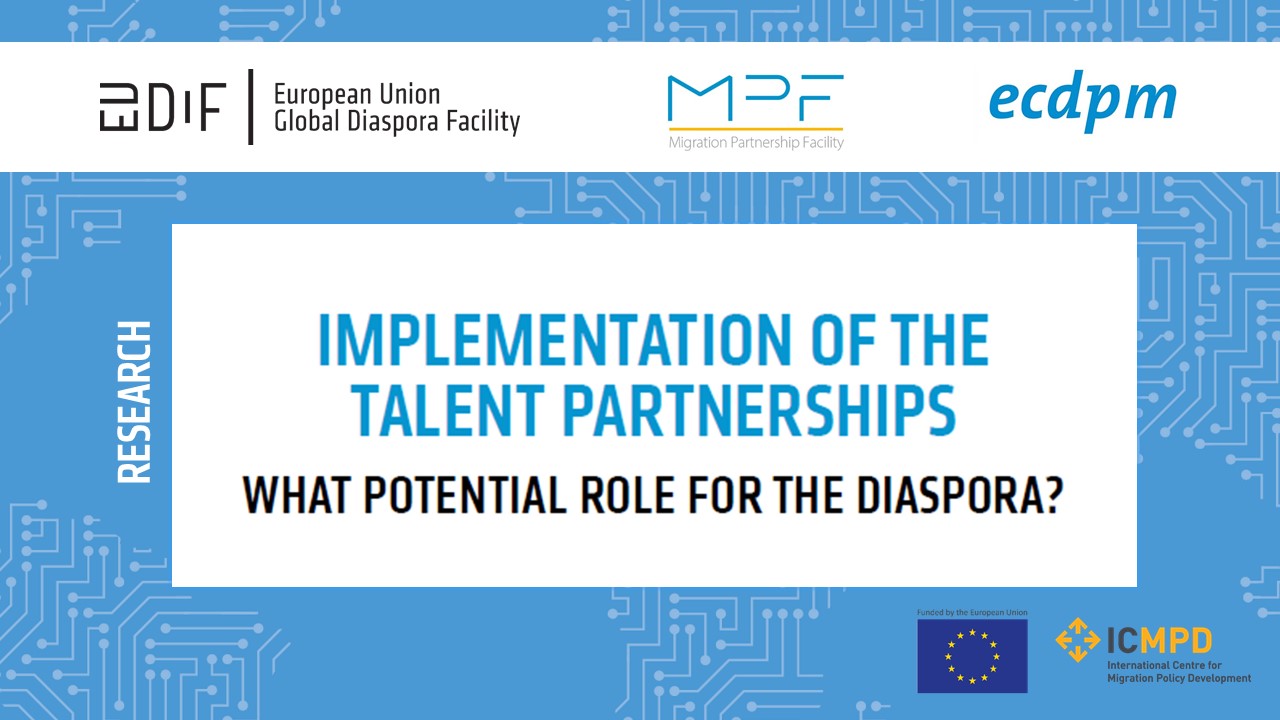
What role can diaspora play in implementing the EU’s Talent Partnerships? To find out, dive into our newly-published research, produced by EUDiF and the Migration Partnership Facility (MPF) in partnership with the European Centre for Development Policy Management (ECDPM).
Almost a year ago, in September 2020, the European Union announced its new Pact on Migration and Asylum, outlining its approach to enhancing legal pathways to the EU and engaging partner countries on migration management.
As part of the broader framework of migration cooperation between the EU and third countries seeking to harness and leverage legal migration, the Pact introduces Talent Partnerships (TPs). These are presented as an opportunity to match labour and skills needs between the EU and third countries, intended to both create better job opportunities at home, as well as legal routes to the EU.
According to DG Home, TPs “aim to provide a comprehensive policy framework, as well as funding support to boost mutually beneficial international mobility based on better matching of labour market needs and skills between the EU and partner countries.”
How does the European Commission propose creating such expansive partnerships? By working together with ministries, employers, social partners, education systems and – crucially for this project – diaspora.
In order to offer solid evidence and recommendations on how to fast-track diaspora involvement in implementing the TPs, we joined forces with our ICMPD sister-project the Migration Partnership Facility (MPF) and engaged the European Centre for Development Policy Management (ECDPM) to conduct research into the potential of mainstreaming diaspora into the TPs.
The research project comprises four country case studies – Ethiopia, Georgia, Morocco and Nigeria – and looks at existing labour mobility schemes and diaspora engagement initiatives. It breaks down diaspora into segments in order to explore different roles to play in facilitating labour mobility between countries of origin/heritage and destination countries. It also analyses the engagement of the diaspora along the migration cycle and maps specific diaspora activities which may contribute to achieving the objectives of the TPs.
The results highlight the multitude of ways in which diaspora activity already supports the ambitions of the TPs and therefore identifies opportunities for partnerships to maximise this potential. There are five areas of immediate interest in terms of how diaspora may contribute to TPs:
- As entrepreneurs and creators of employment in countries of destination
- As facilitators of international trade and investment
- Communities and organisations creating networks for information and resources
- Skills and knowledge transfer
- As actors of integration
To make the most of this potential, the report sets out enabling factors in order to empower the diaspora to engage in, replicate and upscale their various roles along the migration cycle, and identifies what actions international organisations and implementing agencies can play in supporting the diaspora in their roles. 10 entry points for diaspora engagement are elaborated upon by the researchers in the full version of the results.
Read the full report to learn from the different case studies, or use the abridged version for the highlights and recommendations on how to maximise the potential of diaspora to implement the Talent Partnerships.
On Wednesday 22nd September we will host a live discussion on the results of this research. Along with our research partners MPF and ECDPM, we will be joined by DG International Partnerships, DG HOME, AFFORD and Enabel in order to have perspectives from the European Commission, diaspora and an EU Member State on how to make the most of what we see as huge potential.